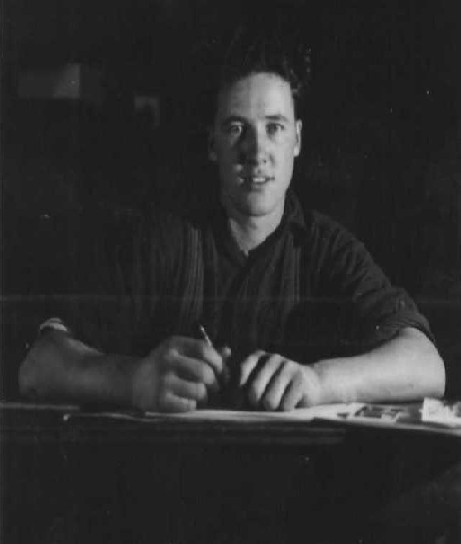Back to Support from Home Page
Canadians
in the 1930s were, in general, much less mobile than they are today.
Traveling was a luxury. Many people did not expect to leave their
province, never mind the country, during their lifetimes. Mennonites
had even less experience with traveling for work or pleasure. They
were usually content to stay in their own communities.
For
many young Mennonite men, living in alternative service work camps
was the first time they have been away from home. Telephone service
was often unavailable. If it was, it could be unreliable. Writing
letters was the main means of communication for COs and their friends
and family.
Mail
call was the highlight of the day for many. A camp official or CO
would collect all the mail and the men would gather around while
he read out the names and handed out the mail. “What a joy for those
who had a letter,” Henry Sawatzky remembers. He, himself, was an
avid writer. During his four-month term at Clear Lake, Manitoba,
he wrote 69 letters. This, he says, was “a good indication that
we were not used to being away from home. Postage on a letter was
$.03 at that time, and our pay was $.50 a day.” [ ASM ,
7-11]
Clear
Lake, in Riding Mountain National Park, was relatively accessible.
Mail arrived daily. In Montreal River, it was a different story.
“During the winter,” Noah Bearinger says, “we only received mail
once a week or rarely twice, but when the roads dried up in spring,
we had better service.”


The
first video is of the mail call at Montreal River. The second video
shows a CO writing a letter home to his girlfriend.
The
camp at Montreal River was one of the first to host COs. In the
six months after it opened in June 1941, COs there received 2,604
letters and 349 parcels. The Northern Beacon, a newspaper
for COs, reported the total of 2,955 with amazement. They also noted
that the number would have been much higher if they had included
the Christmas season.
 |
| A CO in BC writing a letter |
Bearinger
had a girlfriend back home in southern Ontario. When letters came,
he would eagerly look through his letters to see if she had written.
“Other letters that we had received were less important,” he says.
If she had sent him a letter, he sat on his bunk “reading the letters
real slow to let the meaning of each word soak in like the warm
rays of an April sun.” Only after reading this letter would he read
letters from his friends and family. At times these letters were
a bit disappointing, especially considering the high expectations
the COs had. The letters all seemed to say the same things: “Hope
you are all healthy and hope you can all be home for seeding time,”
or “The ministers remembered the boys in camp in their prayers Sunday,”
or “I hope one and all can stay steadfast in their faith, whatever
your lot.” [ASM, 105] These fine thoughts were small consolation
to COs who were dreadfully homesick.
 |
| Fred Cressman sitting on his bunk writing a letter |
At
other times, the mail was much more interesting. The care packages
sent from home could be especially exciting. The COs never knew
what to expect. Sometimes they got knitted socks, sometimes some
baked goods. One CO even received a fully cooked pork roast!
Just
as Canadian families missed their sons and daughters who were serving
in the military, so the families of COs missed their sons and daughters.
It was hard for parents when their children left home, especially
under such dreadful circumstances as war.
 David Jantzi was sent to an alternative service camp for the duration
of the war. He left a young family behind not knowing how
long he would be away.
David Jantzi was sent to an alternative service camp for the duration
of the war. He left a young family behind not knowing how
long he would be away.
Read
some examples of CO mail.
Back to Support from Home Page
|


